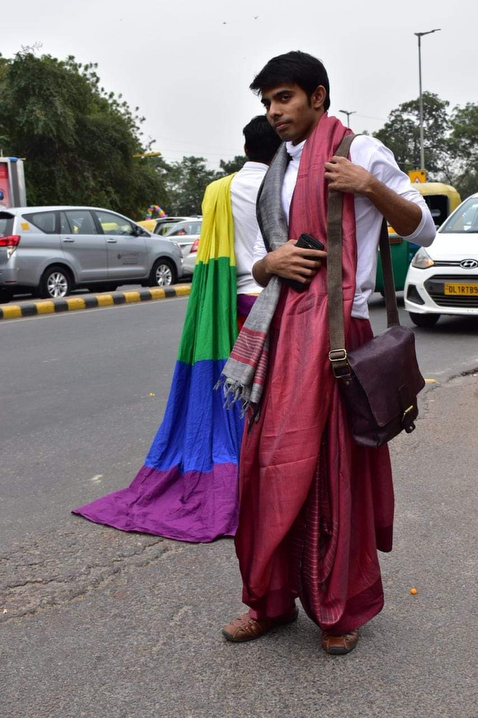Q / India
“My story is about learning care – to give it and receive it. Every moment I spend, in Delhi, Dublin, or Chennai, I am only as queer as I allow myself to be, as queer and as rebellious as permissible. A few friends help me – they gift me sarees, jewellery, hairbands, clips, books, and some courage along with them, and I keep them hidden in my closet. They only come out for those few select, unfettered silences when I may find the comfort of family. The same applies for my pronouns, perhaps. Not many people use them (they/them), but now, I make sure they call me Q. The queerest name I know, and also the easiest to forget — a name that has me asking if this dysphoria in male-passing visage is my own undoing. Why is the public imagination of trans one that restricts itself to the conventional ‘femme’, whatever feminine is to the audience’s most violent gaze? Where are the trans masculinities, the male-passing genderqueer subject, in your idea of resilience? Being Q, to me, also means accounting for this privilege – to hold power in a baritone voice that scratches against the insides of my ears each time I speak, but to find the will to speak nonetheless – reimagining what kinds of kindness queerness could someday be, and now is. Shrouded within this constant denial of needing to prove my queerness daily, I found different transgression: friendship. The only answer to the violence of “he”s – almost as if they’re laughing at me – is in becoming a magnitude of care and beauty that cannot be gendered, of loving so much that friends, even the most conservative, cis, and upper caste individuals, find a joy in making me happy, however little that takes. It’s a joy of being there for those trans and queer citizens (and citizens they are, with, or without documentation) who embody that stunning beauty that doesn’t ask to be seen – much like nature. I now donate my time (and money) to spaces that don’t fill or sate my savior complex’s quota (we all have one), but which, for a partial moment, a single second, gives hope. For all our resistances of the prison industrial complex and capitalistic competition, that remains the truth – that money, in all hypocrisy, can be hope in the oppressive nation-state, and visibility can be destruction-emancipation in the panopticon (a theatre for all to watch us burn, for we are the eternal flame). I document that which I know, and as an academic I archive caregiving as peacebuilding — those friends whose identities (and silences) are weaponized by different hierarchies of ruling elites — as examples of resistance and in parallel, as that which must be resisted. In this Sisyphean struggle, I find my life as a trans person bound and gagged, wishing to be found queer in my the many masculinities that I embody and have rejected for a long, long, long time. I must keep trying — and mostly, I must remember, that you can speak and also listen, carefully, caringly, and as a caregiver. The two are not exclusive, they are by their very existence and definition, a conversation — to remember, to hold true, to mourn with grace, and to someday understand each other. I’d like you to understand me. I’d like to make a few more friends, if I could; just a few more.”




